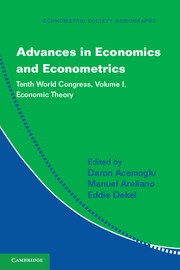Book contents
- Frontmatter
- Contents
- Contributors
- Preface
- I NONSTANDARD MARKETS
- II CONTRACTS
- 4 Contracts: The Theory of Dynamic Principal–Agent Relationships and the Continuous-Time Approach
- 5 Dynamic Financial Contracting
- 6 Comments on “Contracts”
- III DECISION THEORY
- IV COMMUNICATION/ORGANIZATIONS
- V FOUNDATIONS: EPISTEMICS AND CALIBRATION
- VI PATENTS: PROS AND CONS FOR INNOVATION AND EFFICIENCY
- Name Index
- Miscellaneous Endmatter
6 - Comments on “Contracts”
Published online by Cambridge University Press: 05 May 2013
- Frontmatter
- Contents
- Contributors
- Preface
- I NONSTANDARD MARKETS
- II CONTRACTS
- 4 Contracts: The Theory of Dynamic Principal–Agent Relationships and the Continuous-Time Approach
- 5 Dynamic Financial Contracting
- 6 Comments on “Contracts”
- III DECISION THEORY
- IV COMMUNICATION/ORGANIZATIONS
- V FOUNDATIONS: EPISTEMICS AND CALIBRATION
- VI PATENTS: PROS AND CONS FOR INNOVATION AND EFFICIENCY
- Name Index
- Miscellaneous Endmatter
Summary
The theory of contracts was surveyed at a previous Econometric Society World Congress by Oliver Hart and Bengt Holmström (1985). Their masterful survey correctly predicted a major theme that would dominate contract theory in the following decade – namely, incompleteness (Tirole, 1999). Indeed, the two leading textbooks on contract theory both conclude their exposition on this topic (Bolton and Dewatripont 2005; Salanié 2005). Yet, readers would look in vain for this word in the chapters of this volume by Bruno, Thomas, Jean-Charles, and Yuliy. Not once does incompleteness appear and it is hardly mentioned in the recent flurry of papers on the topic that they discuss. What unforeseen contingency has “pumped new blood” into contract theory?
A striking and common feature of these chapters is their technical sophistication. Many – if not most – adopt a continuous-time framework in which output or cash flows are modeled as diffusions: typically, a Brownian or a Poisson process, the drift or jump intensity of which the agent controls. Such modeling offers several benefits.
Before discussing them, I first want to clear up any misunderstanding regarding what the framework does not offer so far. In my view, our understanding of the fundamental properties of optimal contracts under repeated moral hazard, as well as of its basic representation, has hardly evolved since the pioneering work of Rogerson (1985) and Spear and Srivastava (1987). To be sure, the work of Yuliy, for instance (see his Proposition 1), offers an enlightening new take on their characterizations; however, what it gains in elegance, it loses in generality. Microeconomic theorists on a quest for absolute truths are likely to balk at the restrictions for which such models invariably call, although these theorists might be the ones most likely to succumb to the sirens of their mathematical beauty.
- Type
- Chapter
- Information
- Advances in Economics and EconometricsTenth World Congress, pp. 172 - 176Publisher: Cambridge University PressPrint publication year: 2013



